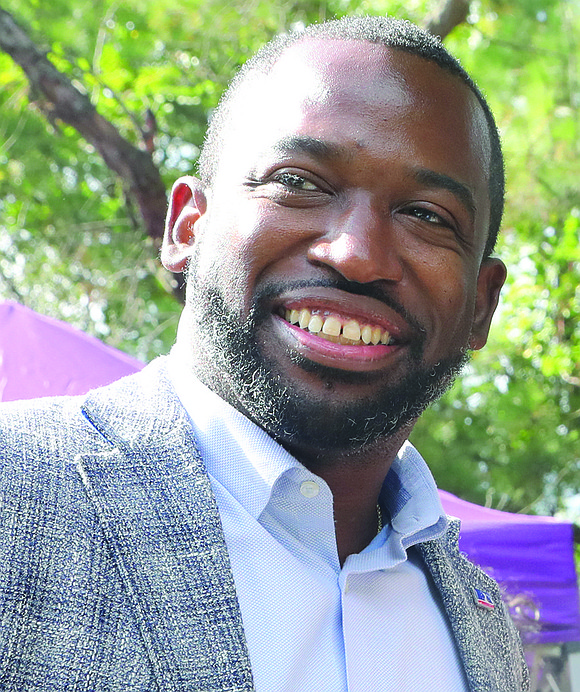Into the future
Heading into 2022, Mayor Stoney details his focus for Richmond’s growth and opportunities in the coming years
Jeremy M. Lazarus | 12/30/2021, 6 p.m.
Mayor Levar M. Stoney is bullish on Richmond as he prepares to begin his sixth year in the city’s top elected office.
Though the pandemic is still raging, the city’s 40-year-old chief executive said in an interview that Virginia’s capital city is ready to take off and that the City of Richmond is going to be part of making that happen.
This was a year of recovery in “which we reclaimed our lives” with the return of festivals and parades and the reopening of businesses and schools, he said.
Ahead, Mayor Stoney said, residents will start to see results from the seeds the city planted to ensure continued growth of development, people and job opportunities.
Even though major projects like the $1.2 billion new Coliseum and Navy Hill development near City Hall and the proposed $565 million casino in South Side that he supported were rejected, Mayor Stoney said more projects are on the way.
For example, he noted the private $325 million redevelopment of the decrepit Public Safety Building on 9th Street, a block from City Hall, is expected to be underway by March, bringing a 20-story office tower, new hotels and retail space to the area.
The mayor noted that the city also is seeking developers to bring offices, housing and new retail to 60 acres of city-owned land on Arthur Ashe Boulevard.
In addition, he said he anticipates City Council soon approving a plan for remaking much of the area near City Hall, including the vacant Coliseum that has moldered for more than two years and the old Blues Armory that has sat idle. The mayor said the council action could be followed next year with requests for developer interest.
As part of that effort, he said his administration has begun talks with Richmond’s judges about building a new courthouse to replace the John Marshall Courts Building, though he said agreement on a new location has not been reached.
The city’s plans are on top of the continuing surge of private development of apartments and commercial space, along with Virginia Commonwealth University’s plans for more than $1 billion in new construction.
In a city where one in four people live in poverty, Mayor Stoney said the potential growth also would help lift up everyone. He said part of his focus is to ensure that his administration “is in the business of directing people to opportunities and creating opportunities.”
He said Richmond has too long been a city of “haves and have nots,” and he regards the coming developments as offering a way to help close that divide.
For Mayor Stoney, one of the major drags on the upbeat future is the violence that has become all too prevalent. Richmond has recorded 91 homicides this year—a 17-year high—even as the Richmond Police Department shrinks in numbers.
Ambitious to leave a legacy that will enable him to run for higher office after his term ends, Mayor Stoney said that public safety “will be a top priority” in the coming year, just as it has been in past years.
He said the spike in violence is happening in cities across the country, and he believes that it is partly the result of the aftershocks from the pandemic that “put a lot of pressure on institutions like the police department, on human services and on our parks, libraries and schools. We’re seeing the effects.”
He said Richmond also is feeling the impact of soaring gun sales and the lingering effects of the May 2020 Minneapolis Police murder of George Floyd that the led to major protests in Richmond and widened “the gap between community and police.”
The trouble has been compounded by the loss of police officers from the Richmond force, in part, because the city has fallen behind neighboring jurisdictions in the pay it provides. More than 120 city police officers have quit in the past 12 months, with far fewer replacements being hired.
To try to bolster a department that the mayor described as a key to creating safer neighborhoods, “we will be working to make pay for our officers more competitive.” He said that pay increases also are needed for firefighters.
He said he is not ready to disclose how the issue will be addressed in the upcoming budget while he awaits results of a pay study, but he said he and City Council are on the same page in making that a major focus.
He said one way to help alleviate some of the issues that have sparked violence is to keep focused on a growth strategy that will open more opportunities for people to succeed.
The mayor said another top priority for him will be to expand the inventory of affordable housing in Richmond. He said he is proud that the city’s Affordable Housing Trust Fund now has more than $10 million to use, thanks to funding from the federal American Rescue Plan.
The explosion in rent and home prices in the past several years has pushed housing to priority status with “education and public safety,” Mayor Stoney said.
He said that his administration’s focus in the years to come also will be on the “quality of life and delivery of basic services.”
For example, city residents already are seeing a major reduction in potholes, thanks to the increased budget for paving.
In the months and years to come, he said he would continue to be “a champion for the working class.”
Given that he cannot run for a third term, Mayor Stoney acknowledged that he is considering his future after his term ends in 2024.
“That may involve seeking another executive office,” he said. “For now, this office is my top priority.”






